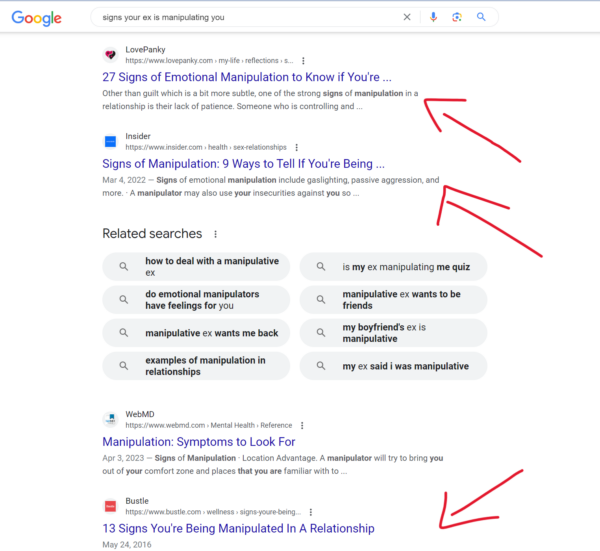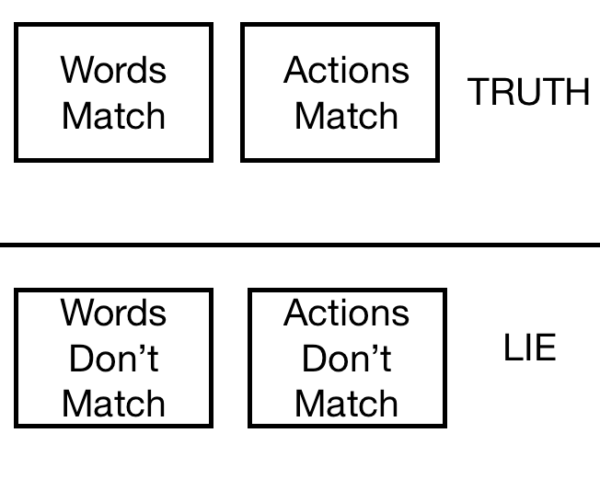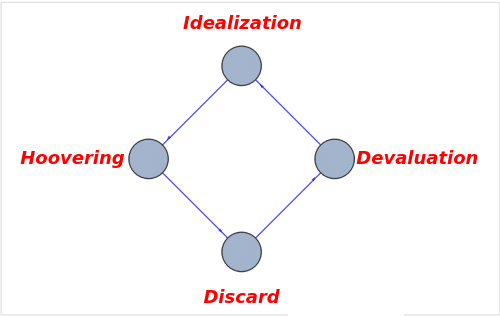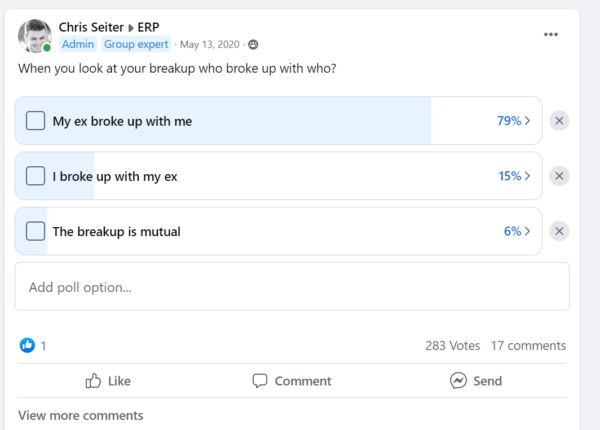I found out the seven major signs you need to keep an eye out for to tell if your ex is manipulating you.
And let me tell you, it’s not always as obvious as you might think. Manipulation can be subtle, and it often plays out in ways that can make you question your own perceptions and feelings. (I’ll be talking about that a lot today unfortunately.)
Basically my aim with this article is to do all the dirty work so you don’t have to.
That’s why I haven’t chosen 50 signs of manipulation or the 800 signs you always see people peddling on the internet.
My rule is simple, my manipulation signs don’t make my list unless I’ve:
- Witnessed them firsthand in my coaching practice
- I’ve found some type of research to back it up
In all, after spending days planning for this article I came up with seven common manipulation tactics that exes will use,
- The Words Vs. Actions Check
- Look At The Narcissistic Hoover Tactics
- They’ll Play the Victim (Even When They Know They’re Not)
- They’ll Use Children or Mutual Friends
- They’ll Overcompensate
- They’ll Bait You
- They’ll Employ Selective Memory
As is always the case, let’s dive in a bit deeper.

What Are Your Chances of Getting Your Ex Boyfriend Back?
Take the quizManipulation Tactic #1: The Words And Actions Mismatch
The first approach, and one of my personal favorites, is the comparison of ‘words versus actions.’
If you’ve been following my work, you’ll know that I frequently refer to this concept when discussing topics such as identifying deceit.
Now, I can’t take credit for ‘words versus actions.’ The accolades should rightly go to Carl Jung, the eminent psychoanalyst.
He once proposed that if you’re struggling to comprehend someone’s actions, examine the outcomes to deduce their true intentions.
When trying to decode potential manipulation, actions become your most reliable barometer.
- If what a person says aligns perfectly with their actions, it’s likely they’re being genuine.
- On the other hand, if their words and actions tell different tales, there’s a strong chance you’re dealing with manipulation or deceit.
Thus, one of the most common behaviors you’ll see from an ex who is likely manipulating you is a lot of mismatch between what they say and what they do.
Manipulation Tactic #2: Look At The Narcissistic Hoover Tactics
In recent times, I’ve spent a good deal of thought on the topic of manipulation, particularly where it intersects with narcissism.
My wife and I have actually been co-writing a series of articles on Narcissistic Personality Disorder.
The aim?
To emphasize the importance of recognizing and eliminating these toxic individuals from your life, rather than trying to win them back.
The fascinating, albeit distressing, aspect of Narcissistic Personality Disorder is the four-part abuse cycle that narcissists typically employ:
- Idealization
- Devaluation
- Discard
- Hoover
It’s really that Hoover stage, where I see a considerable overlap between manipulation and narcissistic tactics, which will be the main focus of this discussion.
When you dissect the narcissistic abuse cycle, you’ll notice that the overt manipulation doesn’t kick in until the Hoover stage.

What Are Your Chances of Getting Your Ex Boyfriend Back?
Take the quizYes, they gaslight and emotionally abuse you throughout, and there’s no disputing that.
But let’s break it down.
- The Idealization stage is essentially the narcissist buttering you up. While the authenticity of their actions during this stage remains debatable
- The Devaluation stage is when they turn into an outright jerk.
- The Discard stage marks the termination of the relationship.
However, the true manifestation of manipulation is during the Hoover stage.
This is when they consciously use words and actions to reel you back into the relationship, with no real intent of commitment on their part.
They’re just trying to secure their supply source.
For more information on what Narcissistic supply is I recommend you watch this video,
Therefore, understanding the Hoover tactics of a narcissist can shed light on whether your ex is trying to manipulate you.
So, what are these Hoover tactics?
- Love bombing tops the list, wherein they lavish you with affection and attention to draw you back. They often make promises of changing their behavior, sometimes even resorting to grand gestures to prove their commitment. Interestingly, these grand gestures seem to contradict the ‘words versus actions’ approach.
- But remember, patterns matter. If they frequently resort to grand gestures but fail to sustain commitment over time, you’re likely facing a Hoover tactic.
- Another Hoover tactic is guilt-tripping. They’ll play the victim, trying to make you feel guilty for leaving them.
- If that doesn’t work, they might switch to fear and intimidation, using threats to coerce you into returning.
- Some may even resort to smearing your name, spreading rumors or lies about you to damage your reputation and isolate you.
Each of these is a manipulation tactic, an attempt to regain control and pull you back into their sphere of influence.
Manipulation Tactic #3: Playing The Victim
The third tactic I want to highlight is when an ex consistently plays the victim.
In my observations, I’ve found that many exes resort to this coping mechanism.
They persistently portray themselves as the victim, even when the circumstances or their own actions say otherwise.
You might argue that this is a way to garner sympathy or induce guilt, even when the other person is not at fault. However, I believe it’s a bit more nuanced.
In cases where an ex consistently assumes the victim role, particularly when they’re evidently guilty, it’s often a defensive mechanism to avoid self-blame.
It’s simpler for them to paint you as the villain than admit their own fault. This aligns with the underlying psychology of anger. If you label someone as ‘stupid’ in anger, the implicit message is ‘they’re stupid, but I’m smart.’
It’s a twisted way to elevate one’s self-esteem.
Playing the victim is a similar strategy.
It’s about shifting blame onto the partner, thereby absolving oneself, because confronting personal faults might bruise the ego. Essentially, it’s a constant self-deception driven by a deep-seated awareness of their own failings.
Manipulation Tactic #4: Using Children Or Mutual Friends
The fourth way an ex might manipulate you is by involving children or mutual friends. If you share a child or common friends with your ex, a manipulative ex might use them as pawns in their scheme.
They could attempt to turn them against you or even use them as conduits for messages.
Regrettably, I’ve seen this scenario play out often, particularly among clients who share a child with their ex.
For instance, the child might be coaxed into believing false or damaging narratives about the other parent. In extreme cases, I’ve even witnessed attempts to involve child protective services based on fabricated allegations.
This doesn’t occur suddenly; it’s more of a gradual escalation.

What Are Your Chances of Getting Your Ex Boyfriend Back?
Take the quizIt might start innocuously, like laying claim to mutual friends or subtly tarnishing your reputation to the child. Such behavior is undoubtedly manipulative and deeply distressing for many of my clients.
Therefore, particularly when children are involved, I strongly advise consulting with a lawyer.
While I’m no expert in family law, I believe it’s crucial to approach a breakup well-informed. Even if you and your ex were never married, it’s important to understand your rights and how to protect yourself and your child from a manipulative ex. So, seeking legal counsel is advisable in such a scenario.
Manipulation Tactic #5: Overcompensation
The fifth strategy to watch for is overcompensation.
Sometimes, an ex may go out of their way to project an image of happiness or success in their post-breakup life.
It’s all a deliberate ploy to give you a sense of missing out.
A few days ago, I wrote an article about the ways exes test you.
One such way I discussed was through passive-aggressive comments subtly woven into social media posts.
Stuff like this,
You see how an ex boyfriend posting that about his ex girlfriend is this subtle passive aggressive dig?
This behavior parallels the manipulative tactic of overcompensation, where they’re implicitly stating,
“I’m doing better. I’m winning the breakup.”
It’s a petty act driven by a desperate need for validation, usually stemming from feelings of depression after the breakup. They’re seeking validation through social media and their audience there.
Manipulation Tactic #6: Baiting
A manipulative ex might try to provoke you into arguments or negative interactions.
They might bring up sensitive topics or make inflammatory remarks, all to get a reaction out of you.
Unfortunately, some exes just want to engage in conflict. Most of us have experienced volatile relationships where it felt like any action we took was perceived as a personal affront, prompting unnecessary arguments.
As I mentioned earlier about the psychology of anger, there’s a cathartic release associated with it.
A few years ago, there was a TED talk discussing the importance of experiencing anger and allowing ourselves to feel it.
While some people might take it to the extreme, anger can offer a cathartic release, particularly when they’re aware they’re in the wrong.
In most of the cases I handle, around 80% involve clients who have been broken up with.
These breakups aren’t typically due to cheating but often stem from an avoidant partner who might have said hurtful things during the breakup.

What Are Your Chances of Getting Your Ex Boyfriend Back?
Take the quizGiven their guilt, it’s easier for an ex to provoke you into a fight and experience the cathartic release of anger than to take responsibility and fully experience the resultant emotions.
Manipulation Tactic #7: Selective Memory
The seventh and final strategy that manipulative exes often use involves selective memory.
It’s common for exes to conveniently forget all the hurtful actions they’ve done, focusing instead on the good times.
This selective memory can make you question your own recollections and judgment, making it a form of gaslighting.
I want to bring your attention to a psychological concept called the ‘peak-end rule.’
This theory suggests that people don’t remember an experience based on its entirety, but rather on its peak moments and its end.
When an ex, particularly one who is avoidant, focuses solely on those peak moments and glosses over the hurtful things they’ve done, they create a distorted reality. They’ll brush off your attempts to remind them of their hurtful actions, choosing instead to dwell on happy memories.
They’ll say things like, “Remember when we did this?” or “Remember when we did that?”
This behavior is particularly manipulative when dealing with someone who is anxious or codependent, as many of our clients are.
These individuals are often eager to return to their exes and are prone to ignoring the red flags. This can lead to them being manipulated again when they re-enter a relationship with their ex.






Eugene
June 23, 2024 at 1:12 pm
My ex we broke up 2 months ago and she moved out and she is staying alone with our 7 months old son but since the break up she said she need space and time to heal and i tried to begging her to come back but she said its over but now if i go silent she will call non stop sending messages asking about baby nappy then if i responds then she sends our baby photos to me sometimes she block me for no reason and i dont bother her ….the painful part is if apologized she dont responds at all she keep quiet but if i said i want to move on she becomes angry and very upset with me and block me ….sometimes she is happy other time angry and she only reach out when i go silent
Sujata
September 26, 2023 at 5:14 pm
Dear Chris
Every article written by you is a great read and a treasure trove to learn and be a better person for ourselves. Thank you for such a great insightful website.
Nathnael Tshepo Mabulela
September 17, 2023 at 5:17 am
Me and my longtime girlfriend separated,she angrily dumped me on the phone and refused meet face to tell me that,she told me that she got a new man,after 7 days I send sms asking to talk to her,as there’s nothing wrong I did to her since we started dating,I gave her my everything together with her 5children,she agreed to meet as I all ready said on my sms that is no about getting together but to iron out our difference’s